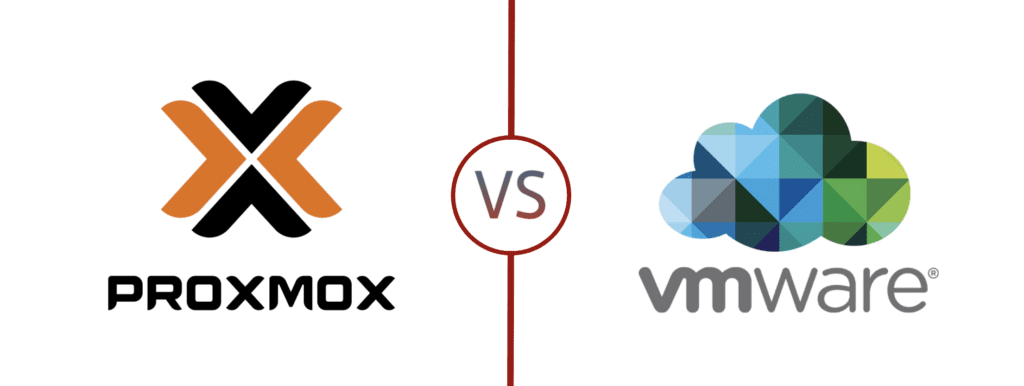Vmware vs proxmox
VMware VS Proxmox; are both key players in virtualization, providing strong solutions for managing and operating virtual machines. However, they have notable differences in licensing, features, performance, and intended users.

VMware: A commercial virtualization platform known for its enterprise-level features, scalability, and high performance. It includes a comprehensive range of products such as vSphere, vCenter, and NSX.
Proxmox VE: An open-source virtualization platform based on the KVM hypervisor, offering an affordable solution for small to medium-sized businesses. It features a web-based management interface and supports containerization technology.
Vmware vs Proxmox: Key Differences
Licensing
- VMware: Requires licensing for various components, making it a costlier option, especially for large-scale deployments.
- Proxmox VE: Open-source, removing licensing costs. However, commercial support is available for an extra fee.
Features
- VMware: Offers an extensive feature set, including advanced high availability, disaster recovery, storage management, and network virtualization. It excels in large-scale and complex environments.
- Proxmox VE: Provides essential virtualization features such as high availability, storage management, and network configuration, with a focus on simplicity and ease of use.
Performance
- VMware: Widely recognized for superior performance, especially in demanding workloads, using advanced hardware acceleration and optimization techniques.
- Proxmox VE: Delivers good performance, particularly for Linux-based virtual machines. While it may not reach VMware’s peak performance in all scenarios, it is often adequate for most workloads.
Target Audience
- VMware: Primarily aimed at large enterprises with complex IT infrastructures and demanding workloads that require advanced features and support.
- Proxmox VE: Appeals to small and medium-sized businesses, budget-conscious organizations, and individuals seeking a free, open-source virtualization solution.
Vmware vs Proxmox: When to Choose Which?

Choose VMware if:
- You need enterprise-grade features and support.
- Your organization has a substantial IT budget.
- You must manage complex workloads and demanding applications.
- You prioritize maximum performance and scalability.
Choose Proxmox VE if:
- You have a limited budget.
- You value flexibility and control over your infrastructure.
- Your workloads are primarily Linux-based.
- You prefer an open-source solution with a robust community.
Why Migrate From VMware To Proxmox?
VMware has long been an industry standard, but its proprietary nature and associated costs can limit its utility, particularly for small and medium businesses. Additionally, with Broadcom’s recent decision, there are even more reasons to consider migrating to Proxmox.

Proxmox presents an open-source, feature-rich alternative to VMware, offering flexibility and functionality that provide significant advantages, including the ability to adapt and scale according to business needs. Its cost-effective pricing model makes it an appealing choice for businesses aiming to optimize costs without sacrificing service quality.
When comparing the two, Proxmox has several advantages over VMware:
- Open-source: Unlike VMware, Proxmox is open-source, benefiting from a global community of developers who continuously improve the software.
- Cost-effective: Proxmox offers a more affordable solution than VMware, eliminating the high licensing costs associated with proprietary software.
- Increased versatility: Proxmox allows for both containerized and virtualized workloads, a feature not available in VMware.
Differences between Proxmox and VMware
Product Type
A key difference is that VMware is a commercial product platform, which means it has a large community of partners and extensive technical support. However, users must pay licensing fees to access these benefits. In contrast, Proxmox is free to use, but you will need to pay for commercial support if you choose to utilize it.
Virtualization Technology Support
Proxmox, as an open-source platform, supports OpenVZ, LXC, and KVM. VMware, on the other hand, supports KVM and its proprietary technology.
Customers and Use Cases
Both Proxmox and VMware are regarded as leading virtualization platforms. However, their similarity lies primarily in their features tailored for cloud computing and server integration. They differ in their use cases and target customer focus.
Proxmox Customers and Use Cases
Proxmox offers a range of high-quality features, making it an appealing choice for many organizations. Its affordability makes it particularly attractive to startups, home enthusiasts, and groups that prefer not to invest in expensive licenses.

Proxmox VE is a versatile virtualization platform that easily adapts to various environments. It is commonly used for server isolation and software development, making it suitable for diverse business types.
Thanks to its open-source nature, Proxmox VE can be tailored for various customers and use cases, including small and medium-sized businesses (SMBs), data centers, and educational institutions. Here are some of the key organizations using Proxmox:
- Educational Institutions: Proxmox is utilized by educational institutions to support their IT infrastructure due to its adaptability and low cost.
- SMBs: Proxmox serves as an economical and effective virtualization solution, particularly for SMBs. Its features, such as live migration, high availability (HA), and backup and restore, ensure reliable uptime and data protection. Additionally, SMBs benefit from the platform’s scalability and performance, enabling efficient management of IT resources.
- Data Centers: Proxmox VE is a visualization solution that allows data centers to manage IT environments smoothly and adapt to various conditions. The platform supports various types of local, networked, and virtual storage, providing data centers with the flexibility to monitor their storage needs. Furthermore, Proxmox VE’s features, including increased availability, clustering, and live migration, help data centers maintain reliable uptime and data integrity.
VMware Customers and Use Cases
While VMware offers a free version of vSphere, organizations seeking high-quality features and support for business-critical applications and infrastructure-as-a-service (IaaS) should consider investing in paid licenses.
These licenses provide enhanced stability and support, which are crucial for maintaining a reliable virtual environment. Additionally, VMware vSphere integrates seamlessly with other VMware solutions, such as VMware NSX, which focuses on network virtualization.

These features enable organizations to leverage a fully integrated virtual infrastructure with robust storage and network resources, along with a centralized management interface for all aspects of the virtual environment. VMware vSphere’s comprehensive capabilities and reliable support attract a diverse range of customers and use cases, including enterprises, cloud service providers, data centers, and educational institutions.
Special Feature
Proxmox is a robust open-source solution that offers a wealth of impressive features. However, in comparison to VMware, it may lack certain functionalities. One significant difference between these two providers is VMware’s built-in support for Kubernetes. Below is a brief overview of the features offered by VMware and Proxmox.
Proxmox Features
- Proxmox includes built-in support for running containers.
- It is compatible with a wide range of hardware and operates smoothly with various systems.
- It features integrated firewall capabilities for out-of-the-box security.
- Proxmox provides a fully organized web interface, simplifying management tasks and facilitating easier monitoring of the virtual environment for organizations.
VMware Features
- VMware enables organizations to plan for future infrastructure needs and workload demands.
- It supports multiple guest operating systems, including MacOS, Windows, and Linux.
- VMware reduces deployment time and enhances DevOps velocity.
- It offers high-level training opportunities for IT professionals.
Data Protection for Proxmox and VMware
Storware Backup and Recovery provides comprehensive data protection for both VMware and Proxmox virtualization environments. It offers agentless backups, ensuring data protection without requiring agents to be installed on individual virtual machines. This approach simplifies deployment and management, lowering the overall administrative burden.

Storware Backup and Recovery supports various backup destinations, including local, remote, and cloud storage, allowing for flexibility and scalability. It also features advanced capabilities like incremental backups, data deduplication, and compression to optimize storage utilization and reduce bandwidth consumption.
Additionally, Storware Backup and Recovery is equipped with strong security measures, including encryption and immutability, to protect data against unauthorized access and ransomware attacks.
Main Functionalities of Proxmox and VMware
Proxmox offers access controls to safeguard applications from data breaches. However, if improperly configured, Proxmox’s open-source software may be vulnerable to malicious activities and may not be suitable for large-scale enterprise environments. In contrast, VMware is predominantly used in enterprise settings due to its scalability and reliability.
[Want to learn more about VMware vs Proxmox? Click here to reach us.]
Conclusion
In conclusion, choosing between VMware and Proxmox ultimately hinges on your organization’s specific needs, budget, and technical requirements. VMware stands out for its comprehensive suite of features, enterprise-level support, and seamless integration with other VMware solutions, making it an ideal choice for large enterprises and complex IT infrastructures. However, its associated costs may be a barrier for smaller organizations.
On the other hand, Proxmox offers a flexible, cost-effective open-source solution that appeals to startups, small and medium-sized businesses, and educational institutions. Its adaptability, ease of use, and strong community support provide a compelling alternative for those looking to manage virtualization without significant financial investment.
For organizations navigating this decision, Bobcares offers robust support services for both VMware and Proxmox, ensuring you have the expertise needed to optimize your virtualization environment. With Bobcares‘ specialized support, you can leverage the strengths of either platform while minimizing downtime and maximizing efficiency.
Both VMware and Proxmox excel in their respective domains, and understanding their strengths and weaknesses will empower you to make an informed decision that aligns with your organization’s goals and operational demands. Whether you prioritize advanced features and support or seek an affordable, user-friendly solution, VMware and Proxmox each offer unique advantages that can help your organization thrive in today’s dynamic digital landscape.







0 Comments